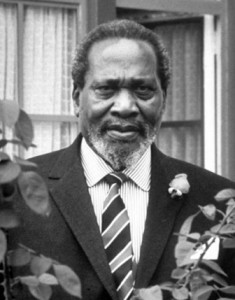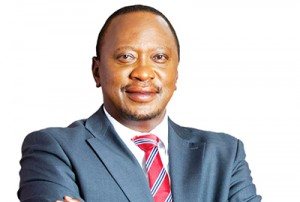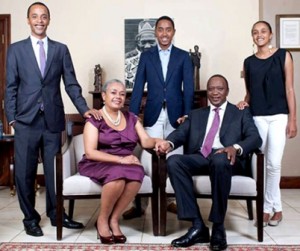Uhuru Kenyatta profile
Uhuru Kenyatta full name is Uhuru Muigai Kenyatta. He was born on 26 October 1961. He is currently the 4th President of Kenya. He was sworn in to office on 9th April, 2013.
Uhuru Kenyatta age
Uhuru Kenyatta is 55 years old as of 2016.
Uhuru Kenyatta Parents
Uhuru Kenyatta is the son of Mzee Jomo Kenyatta who was the first president and founding father of Kenya, and his fourth wife Mama Ngina Kenyatta.
Uhuru Kenyatta Education
Uhuru Muigai Kenyatta attended his foundation classes of kindergarten and Standards One and Two, at Loreto Convent, Valley Road in Nairobi from 1965 to 1968.
Between 1969 and 1980 Uhuru Kenyatta attended St Mary’s School in Nairobi where he graduated with his London GCE A-Levels in 1979.
Uhuru Kenyatta enrolled to study economics, political science and government at the Amherst College in the United States. He graduated in 1985.
Uhuru Kenyatta Early Career
Between 1979 and 1980, Uhuru Kenyatta briefly worked as a teller at the Kenya Commercial Bank Kipande House Branch just opposite the GPO along Kenyatta Avenue Nairobi.
Upon his graduation in 1985, Uhuru Kenyatta returned to Kenya, and started a company Wilham Kenya Limited, through which he sourced and exported agricultural produce. Uhuru says he started the company from a small pickup with which he used to sell French Beans. He would collect them from farmers all the way from Meru, package them and finally export them.
He owned the company for ten years but later sold it at a profit. This was around 1996 – 1997 when he began his political journey.
Uhuru Kenyatta Political Life
In 1996 President Moi Began his preparations to groom Uhuru Kenyatta for bigger things in life. President Moi first made sure Uhuru was chosen as the KANU Chairman of Gatundu Branch.
In 1997, Uhuru contested the Gatundu South Parliamentary Seat under KANU ticket but lost to a Nairobi Architect called Moses Mwihia. His loss was attributed to the KANU apathy prevailing in the Central province at that time.
Knowing very well that he was on his second and last term of his presidency, President Moi had to rush against time to Groom Uhuru before 2002 General elections.
In 1999 Moi appointed Uhuru to chair the Kenya Tourism Board, a government parastatal. Two years after, he was nominated to parliament in 2001, and subsequently appointed to the cabinet as Minister for Local Government.
Following this, he was elected as the First Vice Chairman of KANU still in 2001. These quick successive elevations of Uhuru Kenyatta raised eyebrows among the current KANU stalwarts like Musalia Mudavadi, Kalonzo Musyoka, George Saitoti and newly recruited Raila Odinga.
In 2002 during the KANU National Delegates Conference,President Moi used some underhand dealings to install Uhuru Kenyatta as the Kanu Presidential candidate. This caused a massive walkout by disgruntled members like Musalia Mudavadi, Kalonzo Musyoka, George Saitoti and newly recruited Raila Odinga.
After the general elections Uhuru Kenyatta garnered 31% of the vote and came second to Mwai Kibaki. He took up the role of the leader of Official Opposition in Kenya in 2003.
In January 2005, Uhuru Kenyatta defeated Nicholas Biwott for chairmanship of KANU, taking 2,980 votes among party delegates against Biwott’s 622 votes.
In 2007 Uhuru Kenyatta led KANU to join the coalition of Party of National Unity – PNU led by President Mwai Kibaki. PNU won the hotly contested 2007 general elections with a very narrow margin which sparked violent protests from their rivals ODM leading to the infamous 2007/2008 Post Election Violence – PEV.
After the PEV mediation’s by Kofi Annan, Kibaki remained as president in a power sharing agreement with Raila as Prime Minister, while Uhuru Kenyatta was Kibaki’s choice as Deputy Prime Minister and Minister For Trade. In the following year President Kibaki appointed him to a new post of Minister for Finance. Initially in January 2008, President Kibaki had appointed Uhuru Kenyatta as the Minister for Local Government but two months later he was appointed Minister for Trade in the Coalition Government.
On 15 December 2010 Uhuru Kenyatta was named as a suspect of crimes against humanity by the International Criminal Court prosecutor Luis Moreno Ocampo, for planning and funding violence in Naivasha and Nakuru.
In January 2012, Uhuru Kenyatta resigned from his Cabinet post after the ICC confirmed the cases against him.
On 20 May 2012, Uhuru Kenyatta launched The National Alliance party – TNA in a modern high-tech dome at the Kenyatta International Conference Centre. His presence at the TNA launch was a strong indication that he would contest for the party’s presidential nomination ticket in his quest for Kenya’s Presidency in the 2013 General Elections.
In 2013, Uhuru formed a coalition with William Ruto’s URP and other small parties to form the Jubilee Alliance Party which propelled him to win the 2013 presidential elections.
According to the IEBC, Uhuru Kenyatta garnered 6,173,433 votes (50.03%) and Raila Odinga garnered 5,340,546 votes (43.4%) out of the 12,338,667 votes cast.
On 9th April, 2013 Uhuru Kenyatta wad sworn in as the Fourth President of the Republic of Kenya.
Uhuru Kenyatta ICC Case
After the 2007-2008 post election violence a commission of inquiry was formed to investigate the cause. This commission was headed by Justice Philip Waki. The Commission is famously known as the Waki Commission.
The Waki Commission Came up with findings which it gave to Kofi Annan. Kofi Annan gave the report to the ICC Chief Prosecutor Luis Moreno Ocampo.
On 15 December 2010, Luis Moreno Ocampo came up with a list of six individuals who he said bore the greatest responsibility for the planning and executing the 2007-2008 post election violence in Kenya. These six individuals were referred to as The Ocampo six.
They were Uhuru Kenyatta, William Ruto, Joshua arap Sang, Henry Kiprono Kosgey, Ambassador Francis Muthaura and former Police Commissioner Hussein Ali.
Uhuru Kenyatta was named for planning and funding violence in Naivasha and Nakuru. He was accused of organising a Kikuyu politico-religious group, the Mungiki to evict anti PNU population from Naivasha and Nakuru.
Uhuru maintained his innocence and wanted his name cleared. On 8 March 2011, he was indicted after being summoned to appear before the ICC pre-trial chamber. He was to appear at The Hague on 8 April 2011 alongside the 5 other suspects.
On 29 September 2011, while seeking to exonerate himself, Uhuru Kenyatta put up a spirited fight as he was being cross-examined by ICC Chief prosecutor Luis Moreno Ocampo in the Hague, denying any links with the outlawed Mungiki sect.
Uhuru Kenyatta said Raila Odinga should take political responsibility for the acts of violence and killings that followed the 2007 presidential elections in Kenya.
He told the three judges that “by telling his supporters election results were being rigged, fanned tensions and then failed to use his influence to quell the violence that followed the announcement of the 2007 presidential results.”
On 23 January 2012, the ICC confirmed the cases against Uhuru Kenyatta. There are also serious concerns about witness tampering and indeed, a number of witnesses have disappeared or died.
On 31 October 2013, the ICC postponed Uhuru Kenyatta’s trial for crimes against humanity by three months until 5 February 2014 after the defense had requested more time.
On 8 October 2014, Kenyatta appeared before the ICC in The Hague,making history as the first sitting head of state to come before the ICC. He was called to appear at the ICC “status conference” when the prosecution said evidence needed to go ahead with a trial was being withheld.
In a speech to the Kenyan parliament Kenyatta said that he was going to The Hague in a personal capacity and not as president of the country, so as not to compromise the sovereignty of Kenyans. President Uhuru Kenyatta relinguished his presidential powers for two days to his deputy William Ruto so that he would remain like a normal citizen when going to the Hague.
Uhuru Kenyatta did not speak in court, but denied the charges in comments to journalists as he left the court to catch a flight back home. “We as Kenyans, we know where we came from, we know where we are going, and nobody will tell us what to do,” he said.
On 5 December 2014, prosecutors at the ICC withdrew the charges against Uhuru Kenyatta. The prosecutor’s office said that the Kenyan government had refused to hand over evidence vital to the case.
Uhuru Kenyatta TNA – The National Alliance Party
On the advent of President Kibaki’s departure, it became apparent that his lieutenants favoured Musalia Mudavadi as his successor. After realizing this Uhuru Kenyatta had to find a vehicle for his presidential bid.
On 20 May 2012, Uhuru Kenyatta launched The National Alliance party at the Kenyatta International Conference Centre.
Kenya’s Justice and Constitutional Affairs Minister Eugene Wamalwa and Eldoret North Constituency MP William Ruto led more than 70 MPs in attending the function.
Speaker of the East African Legislative Assembly, Mr. Abdi Ramadhan, Cabinet Ministers Mohamed Yusuf Haji, Jamleck Irungu Kamau, Dr. Naomi Shaaban, Samuel Poghisio, Professor Sam Ongeri and Dr. Mohammed Kuti and MPs Charles Cheruiyot Keter, Aden Bare Duale and Mohamed Maalim Mohamud also attended the event.
Speeches at the launch revolved around the need for a thriving economy, the need for the rights of people of all classes in society to be championed, the need for peaceful co-existence, the need for visionary and committed leadership, the need for transformative leadership, the need for a youthful crop of committed professionals in leadership, the need for free and fair nomination and election processes in the General Election, the need for an economically empowered youth and a call to bring an end to divisive and sectarian interests in politics to safeguard Kenya from sliding to dictatorship.
The National Alliance – TNA Party Officials
- Johnson Sakaja – Chairman
- Onyango Oloo – Secretary General
- Lydia Mokaya – Deputy chairperson
- Wambui Gichuru – Treasurer
Uhuru Kenyatta Presidency
The first term of President Uhuru Kenyatta was characterized by many ups and Downs.
Uhuru Kenyatta major developments
- Free maternal care in all public health facilities
- Flagging off construction of standard gauge railway
- Flagging off construction of the largest Geothermal plant in the world at OlKaria Naivasha
- He has spearheaded peace initiatives in the Democratic Republic of Congo, Burundi, South Sudan and maintained a force in Somalia.
- Spearheading a strong Africa Centered foreign policy that champions for intra-Africa Trade.
Uhuru’s challenges
- Rampant insecurity resulting to numerous terror attacks from Al-Shabaab in Westgate Mall, Garissa University, Mpeketoni in Lamu County and Mandera attacks.
- Rampant Corruption which has lead to suspension of members of his cabinet.
Uhuru Kenyatta foreign Policy
In 2013, foreign democracies warned Kenya against electing Uhuru Kenyatta because he had been indicted by the ICC. They said that ‘Choices have consequences’. Britain categorically said that they will only maintain essential contacts with Kenya.
This statements formed the earlier approach of “Facing East” as opposed to the west. Uhuru Kenyatta began a charm offensive of signing contracts with Eastern Countries such as China. It is said that it is in this period that Uhuru Replaced the Britain made Presidential Land Rover with a Japanese Toyota Land Cruiser.
His activities have however been more robust at the Africa level where he has pushed more intra-Africa trade and economic independence of African nations.
Uhuru Kenyatta has successfully rallied the AU against the ICC culminating in an Extraordinary Summit of the African Heads of State which resolved that sitting African Heads of State should not appear before the ICC.
The AU further asked the Security Council to suspend his trial at the ICC; for the first time ever, the Security Council resolution was defeated by abstention with 9 members of the Council abstaining rather than voting against so as not to offend Uhuru Kenyatta.
The Assembly of State Parties of the ICC would two days later amend the ICC statute to allow for one to appear by video link, a proposal President Kenyatta had made when he was Deputy Prime Minister.
President Kenyatta has led and negotiated peace agreements in South Sudan and in the Democratic Republic of Congo.
At the East African level, Uhuru Kenyatta has developed a close relationship with the Ugandan President Yoweri Museveni and Rwanda President Paul Kagame, creating the Coalition of the Willing, a caucus within the EAC that has signed on to more joint development and economic agreements than the other EAC partners, including a joint tourist visa.
It had been perceived that his administration’s relations with Botswana were strained due to Botswana’s support of the ICC process. He has since visited Botswana to remove this perception and Botswana voted in favour of the AU’s ICC Resolution.
As expected, he has remained close to China which is funding most of his infrastructural projects.
Uhuru Kenyatta’s Wife
Uhuru married his sweetheart Margaret Wanjiru Gakuo in 1989. She was born on April 08, 1964. In 2014, she was named the UN Person of the Year. Since her husband became president, she has been campaigning to lower child maternal mortality rates.
Uhuru Kenyatta Children
- Jomo Kenyatta
- Jaba Kenyatta
- Ngina Kenyatta
Uhuru’s extended Family
Uhuru’s siblings are Kristina Wamboi, Anna Nyokabi and Muhoho Kenyatta
Kristina Wambui was born in 1952 and is married to Victor Pratt.
Anna Nyokabi Gatheca is the Kiambu women’s representative.
Muhoho Kenyatta is responsible for operating the vast businesses of the Kenyatta family, which include Heritage Hotels, Mediamax Group, Commercial Bank of Africa, and Brookside Dairy. He prefers to live out of the public eye. He is the Executive Chairman of Brookside Dairy and the Deputy Chairman of Commercial Bank of Africa.
Uhuru Kenyatta wealth, Net worth
Uhuru is worth $500 Million or Ksh. 50 Billion.
Uhuru Kenyatta businesses, investments
- Kenya’s largest dairy company Brookside Dairies,
- Media company Mediamax,
- Heritage Hotels,
- Commercial Bank of Africa and
- Hundreds of thousands of prime Kenyan land
Uhuru’s video of his life
Uhuru Kenyatta Contacts
Web: http://www.president.go.ke/
Telephone: +254 733 330 080, +254 20 2227 436, +254 724 256 522
@UKenyatta on Twitter